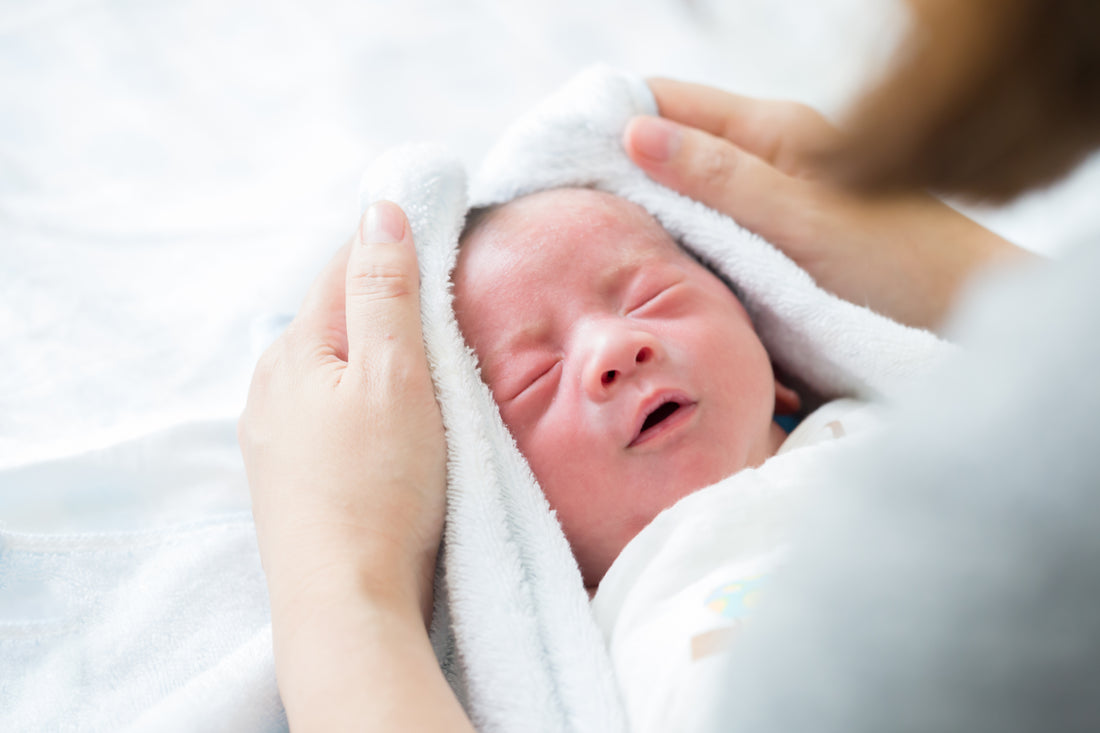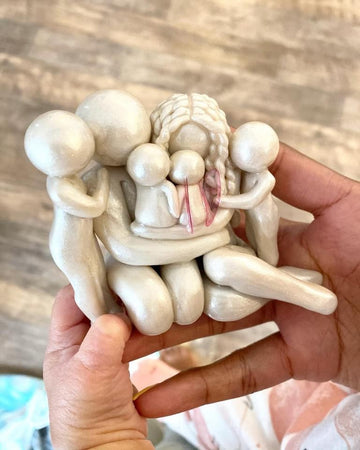Don't Bathe that Baby (Yet)!

The joy of life is a beautiful miracle – covered in a creamy, goopy, sticky, or slippery substance, known as vernix.
When most new parents-to-be watch birth videos and envision their own labor, typically they assume hair and makeup will be done and their baby will be bathed and swaddled before being gently placed in their arms. Welcome to the Twilight Zone. That is not reality; nor should it be!
Birth is raw, messy, intimate, and all-consuming. There is nakedness and crying, poop, and blood. IT IS REAL. And one of the most valuable moments of birth is the baby being placed directly to Mom’s chest for skin-to-skin.
It’s amazing how the umbilical cord is just long enough for this to happen. Body temperature regulates, first real breaths are taken, eye contact is made, and nursing may begin. The placenta is then birthed, the cord completes pulsing, is cut, and the baby is now an independent being.
You will be in such awe that you won’t care about the thick vernix coating parts of your baby’s skin. After some time though, nurses may say that newborn procedures are ready to be done, and that they include that first bath. Some birth teams even make the bath sound like a necessity. In reality, all procedures can be done in the bed with you holding or next to your baby. Once they are done, there is absolutely no reason for anything else to be done – including that bath!
WHY?
Why would you not want a ‘clean’ baby to hold and show off?
Let’s talk about that vernix….
Vernix is composed of the “skin cells your baby made early in development. It contains proteins that prevent common bacterial infections. Think of vernix as a sort-of natural antibacterial ointment. Your baby is born covered in this anti-germ barrier. Bacteria such as Group B Strep and E. coli are often transmitted to newborns during delivery and can cause bloodstream infections, pneumonia and meningitis, and can be fatal. These are not rare infections– we test babies for them daily. Vernix is nature’s protection against these infections.”
Instead of cleaning vernix off, it should be rubbed and massaged into baby’s skin. Think of it as the most important massage a baby gets! It will keep that baby skin soft, smooth, and smelling new for days!
Why shouldn’t you bathe baby after rubbing in the vernix?
There are six important reasons to skip that first bath and prolong for at least 48 hours, but up to weeks after birth.
#1 Blood Sugar Stabilization
“In the first few hours after birth a baby has to adjust to life outside the uterus, including losing the placenta as a source of blood sugar. Bathing causes crying, stress and the release of stress hormones. Stress hormones can cause a baby’s blood sugar to drop, which can make a baby too sleepy to wake up and breastfeed, causing the blood sugar to drop even more. Rarely, low blood sugar can cause neurological injury.”#2 Temperature Regulation
Giving a baby a bath too soon can increase risk of hypothermia. In the womb it is about 98.6 degrees, but most babies are born in rooms that are about 70 degrees. It will take hours for the baby to balance her own body temperature; being held skin-to-skin on the mother’s chest allows for this to happen naturally. If a baby gets too cold, he or she can drop their blood sugar or have other complications.#3 Bonding
The first bath should be done at home with the parents. The hours after birth should not be interrupted, but celebrated as a family. Allowing for a natural transition to the world is what is best for both mother and baby, and a bath interrupts the transition.#4 Breastfeeding
Research is overwhelmingly in favor of skin-to-skin, and skipping the first bath having a direct correlation to early breastfeeding success. A baby who transitions calm and smooth will naturally begin to breastfeed throughout the first hour of life. Lactation consultants agree with this research, stating that a bath disturbs the peace and transition and can interfere with nursing, making baby overly tired and unwilling to try as hard.#5 Skin Protection
As the vernix acts as a protective agent against disease and illness, it also protects from simple things such as dry patches and sensitive areas – especially when a diaper is added into the mix.#6 A Safer Environment
Hospital staff are required to wear gloves when handling an unbathed baby, but this is not so once baby is bathed. Keep all of those unneeded germs off of your newborn!
Soak in all the joy and messiness that is birth. Love it all. Take your time getting to know your newborn, and remember that you are the parent; you make the rules.







